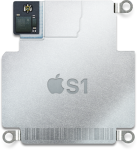 I was running with my Apple Watch the other week* and was struck with a simple thought; ‘there is probably more power in that little thing on my wrist than all the computers that put man on the moon’
I was running with my Apple Watch the other week* and was struck with a simple thought; ‘there is probably more power in that little thing on my wrist than all the computers that put man on the moon’
So, a simple Google Search later (which ironically also uses more computing power than the Apollo missions) and I was right.
The Apollo Guidance Computer (AGC) on board the lunar module (LM) executed instructions at a speed of about 40 KHz (or 0.00004 GHz), about 100,000 times slower than a high-end laptop today. There was also a similar real-time computer built into the Saturn V rocket. On the ground, NASA had access to some of the most powerful computers of the day: five IBM model 360/75 mainframe computers, each about 250 times faster than the AGC. They were running nearly 24/7, calculating lift-off data and orbits, monitoring biomedical data during the mission, and performing numerous other calculations.
Compared to say the Apple Watch:

The S1 integrated computer.
Produced From November 13, 2014 to Present
Designed by Apple Inc.
Common manufacturer(s)
Samsung[1]
Max. CPU clock rate 520 MHz
Min. feature size 28 nm
Instruction set ARM
Microarchitecture ARMv7-A compatible
Product code APL0778
Cores 1
L1 cache 32 KB data
L2 cache 256 KB
GPU PowerVR SGX543
Now I am not saying the Apple Watch is a supercomputer (technically, compared to the stats of the Apollo Guidance Computer, an electonic toaster is faster) but it is amazing just how far we have come in computing power.
So, this led me to my second thought (two thoughts in one day!); Moore’s law (basically computing power will double every two years for the same price) has been shown to be fairly accurate up to this point. But why hasn’t human accomplishment been the same? I mean, what has some recent great accomplishments – comparable to landing on the moon – has the human race done recently? (yes, computers have gotten faster, the Internet can be handy for finding cat videos, etc) but these to me are just evolutionary changes, not revolutionary.
Some might say that having a supercomputer in your hands should make you smarter, but is it making us lazier? Why try to figure out how to fix something when you can just Google it (or buy a new, faster one) ?
Anyways, I’m not here to answer that. Google should do it for me…
*and the last time…stay tuned for our next exciting episode ‘Goodbye Apple Watch’